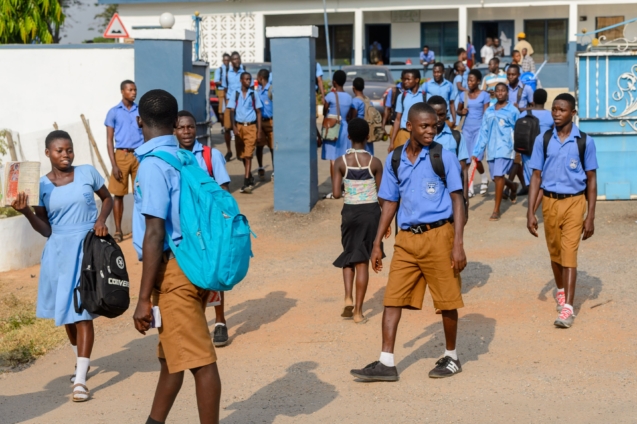There is sweeping reforms to the Senior High School system as government commences the implementation of a new curriculum on Monday, November 4.
Government says the changes are to focus on building character development and holistic education to create well-rounded, ready-for-the-world students.
The new curriculum also takes over from the existing system with students now required to do a minimum of seven and a maximum of nine learning areas in school.
In an interview with JoyNews, the acting head of Curriculum Development at the National Council for Curriculum Assessment (NaCCA), Reginald Quartey explaining why this change is necessary noted that the new curriculum is expected to shape learners since the 21st century skill and competence is being integrated to be able to develop values.
“The curriculum is not only looking at what we call the cognitive domain but we are also looking at the behavioral and social domains including values. We were thinking that this curriculum should be as such that after learners have through this curriculum a number of years, you will be able to major based on the kind of things you see in our society,” he explained.
The major changes include grouping specific learning areas into four groups with students at liberty to choose subjects that were not included in the original courses.
Director General of NaCCA, Professor Yayra Dzakadzie explained this new system with General Science as a case study.
“The curriculum is organized into four groups: A, B, C, and D. Group A includes core subjects mandatory for all learners. For science students, core science is replaced by dedicated courses in physics, chemistry, and biology.
"Group C offers subjects related to specific learning areas, such as additional mathematics, food and nutrition, and electronics. Science students may take courses from Group C to broaden their studies. Group D provides options outside the core science focus, including economics, religion, history, and Ghanaian languages, allowing students to explore additional interests. However, students are limited to a maximum of nine subjects for program completion.”
Prof Yayra Dzakadzie added that significant and extensive engagement has been done with all stakeholders before this implementation.
Latest Stories
-
Shippers’ Authority blocks arbitrary fee hikes with new regulatory powers
3 hours -
Cedi to remain broadly stable in coming months; gained 30% against dollar since January 1
3 hours -
Mahama declares galamsey a national emergency, orders arrest of rogue taskforces
4 hours -
Ghana champions youth skills with national dialogue and launch of TVET Week 2025
4 hours -
Ghana’s inflation to remain on a downward trajectory in second-half 2025 – Fitch Solutions
4 hours -
‘Deal with galamsey, the situation is urgent’ – National House of Chiefs president to Mahama
4 hours -
AG directs EOCO to investigate NDC executives cited in galamsey allegations
4 hours -
Mahama pledges 70% world market cocoa price to farmers
6 hours -
EOCO teams up with Nigerian agency to rescue trafficking victims
6 hours -
State funeral to be held for Joseph Kobina Ade Coker on August 1
6 hours -
Mahama orders arrest of fake anti-galamsey taskforce extorting miners
6 hours -
Joseph Kobina Ade Shino Coker
6 hours -
Royal Sweet Limited signs up for JoySports Invitational Tournament 2025
7 hours -
Ghanaian movie industry wasting talent – Gloria Sarfo
7 hours -
Ho West MP secures 100 international scholarships for constituents
8 hours

